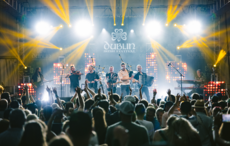Neal Dow hated alcohol and he was not a big fan of the Irish either.
In his memoir, The Reminiscences of Neal Dow, the former Mayor of Portland shared his impressions of visiting Ireland, just a handful of years after the Great Hunger:
“A glorious country Ireland is, but the people are reduced to a condition of the most extreme poverty, largely by whiskey.”
Dow served as Mayor of Portland, Maine from 1851-1852 and 1855-1856, a time when the city’s Irish population shot to 11%, most of the newcomers from among the two million people who fled famine-stricken Ireland in a desperate bid to survive.
Read More: An Irish reporter's hilarious account of Prohibition in America
But it’s fair to say that, by and large, Mayor Dow and the Irish of Portland did not get along. Known as the “Napoleon of Temperance,” Dow was a founding member of the Maine Temperance Union and lobbied passionately to see alcohol banned. As a Quaker, Dow was a staunch abolitionist and rightly took particular issue with the rum trade for its reliance on slavery. But he also envisioned a society in which no alcohol, not even beer or wine, would be available.
He hated alcohol so much that, according to the Irish Times, as fire chief, he once let a Portland liquor store burn to the ground instead of fulfilling his duty.
After taking office as mayor, he persuaded the Maine state legislature to pass a Prohibition law, and Maine became the first state in the union to ban alcohol. Its sale and purchase were only allowed for “medical, mechanical, or manufacturing purposes,” and to do either one needed a special license. He was especially stringent in enforcing the new law in Portland, giving alcohol purveyors a two-week grace period to sell their alcoholic products out of state before the crackdowns began.
Read More: My great aunt, the bootlegging Irish nun in Prohibition America
According to Smithsonian Magazine, “along with rum and slavery, Dow was also opposed to immigration–particularly from Ireland. His xenophobic opposition was clear to Portland’s large population of Irish immigrants, who were disproportionately impacted by the law.” This led to much conflict in the largely Irish and poor Portland neighborhood of Munjoy Hill, where raids and searches were especially frequent.
When Dow lost his re-election campaign for mayor in 1852, he blamed his loss on supposedly illegal voting by Irish immigrants, noted Frank Byrne in his 1961 book Prophet of Prohibition: Neal Dow and His Crusade.
Elected again in 1855, Dow would only be in office for two months before the infamous Portland Rum Riot of June 2, 1855. Some of Portland’s Irish and German residents (who also felt unfairly targeted by the prohibition law) caught wind of the fact that Dow had stored $1,600 worth of alcohol in a vault under City Hall and were not pleased.
Read More: High and dry 100 years ago in New York during Prohibition
Dow claimed that he only intended to sell the alcohol its legal purposes, but he had broken his own law: he did not yet have the license required to possess alcohol for legal sale. The laws in Maine at the time were also such that any three concerned citizens could petition for a search warrant from a judge. As the New England Historical Society recounts, three Irish representatives did just that on June 2, 1855 and marched to City Hall, where a crowd was starting to gather.
They presented the warrant but were denied access by the police. The angry crowd swelled to 3,000 people and began hurling rocks against the door where the liquor was stored. Incensed, Dow called in the militia and ordered them to shoot.
A 22-year-old man named John Robbins, whose wedding would have been the following day, was shot and killed, and seven other protesters were wounded.
In the wake of the Portland Rum Riot, Dow was tried but acquitted for his role in ordering the militia to shoot. However, his political career did not recover and he lost his bid for reelection the following year. What’s more, his political opponents then overturned Maine’s Liquor Law, and the bars and saloons opened once again.
Dow went on to serve as a Brigadier General for the Union in the Civil War and continued to fight for Prohibition until he died at 93 years of age in 1897.




Comments